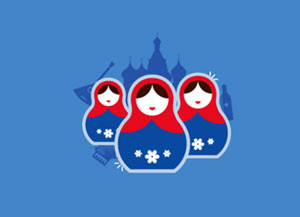
Growing interest in the Russian language in the world
Some 30 years ago about 350 million people in the world spoke Russian language.
But after the Soviet Union disintegration the number of
Russian-speaking people started decreasing rapidly. By 2000 it had
decreased by 50 million. But at present the tendency has changed. The
interest in the Russian language has been constantly growing. Nowadays
it is studied at schools and universities in the countries of the near
and far abroad.
This trend is due to the developing cooperation between Russia and the
CIS countries and to the appearance of international companies. A lot
of Russians are traveling abroad for leisure or on business, a great
number of foreigners are willing to visit Russia in order to establish
business relationships or to get acquainted with the traditions and
culture of the Russian people. And for the purpose they prefer to
communicate in Russian.
Many countries in the world have Russian diasporas. For example, 12
000 Russians live in Bulgaria, 13 000 – in Azerbaijan. All this makes
Russian not only popular but important. More and more people from the
CIS countries and abroad recognize the need to study the language.
Every year the number of foreign citizens who want to live, study and
work in Russia is growing.
The survey in the 12 former USSR republics conducted in 2008 testifies
to the fact that most people living there can communicate in Russian.
In some of these countries most of the population speaks this
language. For example, in Ukraine this figure amounts to 65%, in
Kazakhstan – to 62%, in Byelorussia – to 77%. In Kirghizia, Latvia,
Moldova, Estonia about a quarter of population speaks Russian fluently
and uses the language for everyday communication. In Georgia, Armenia,
Azerbaijan, Lithuania and Tajikistan Russian is spoken by about 30%.
In some CIS countries decrees were issued aimed at protecting the
Russian language at educational institutions which, in its turn,
increased the number of people studying the language. Thus, in
Azerbaijan the outflow of the Russian-speaking population decreased
considerably and 7% (about 109 000 people) get education in Russian.
The Ministry of Education and Science of Russia and the Ministry of
Education of Azerbaijan launched a pilot project aimed at advanced
study of Russian. The project has been implemented in 50 Azerbaijani
schools. Besides, it was decided to increase the number of Russian
lessons at schools twice.
In Kazakhstan more than 40% students study in Russian. At other
schools Russian is a compulsory subject in the school curriculum. In
Kirghizia the number of Russian-speaking students has been gradually
growing.
In Armenia certain levels of language proficiency are set which are
required for admission to the country’s universities. Armenian
students can take the choice of English or Russian language. The
importance of Russian can be corroborated by the following figures:
in Armenian schools:
- Russian language teachers make 51% (1500) of all teachers;
- English language teachers make 30% (930);
- French language teachers make 10% (350);
- German language teachers make 9% (320).




